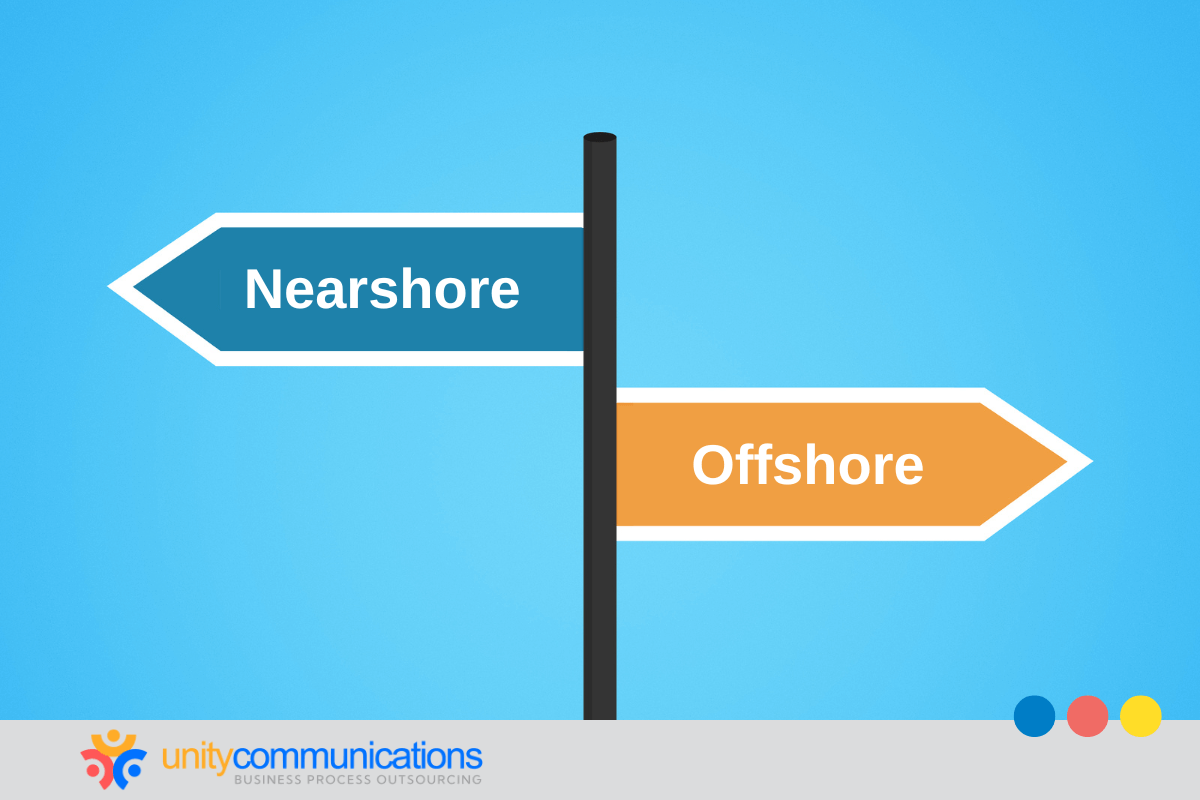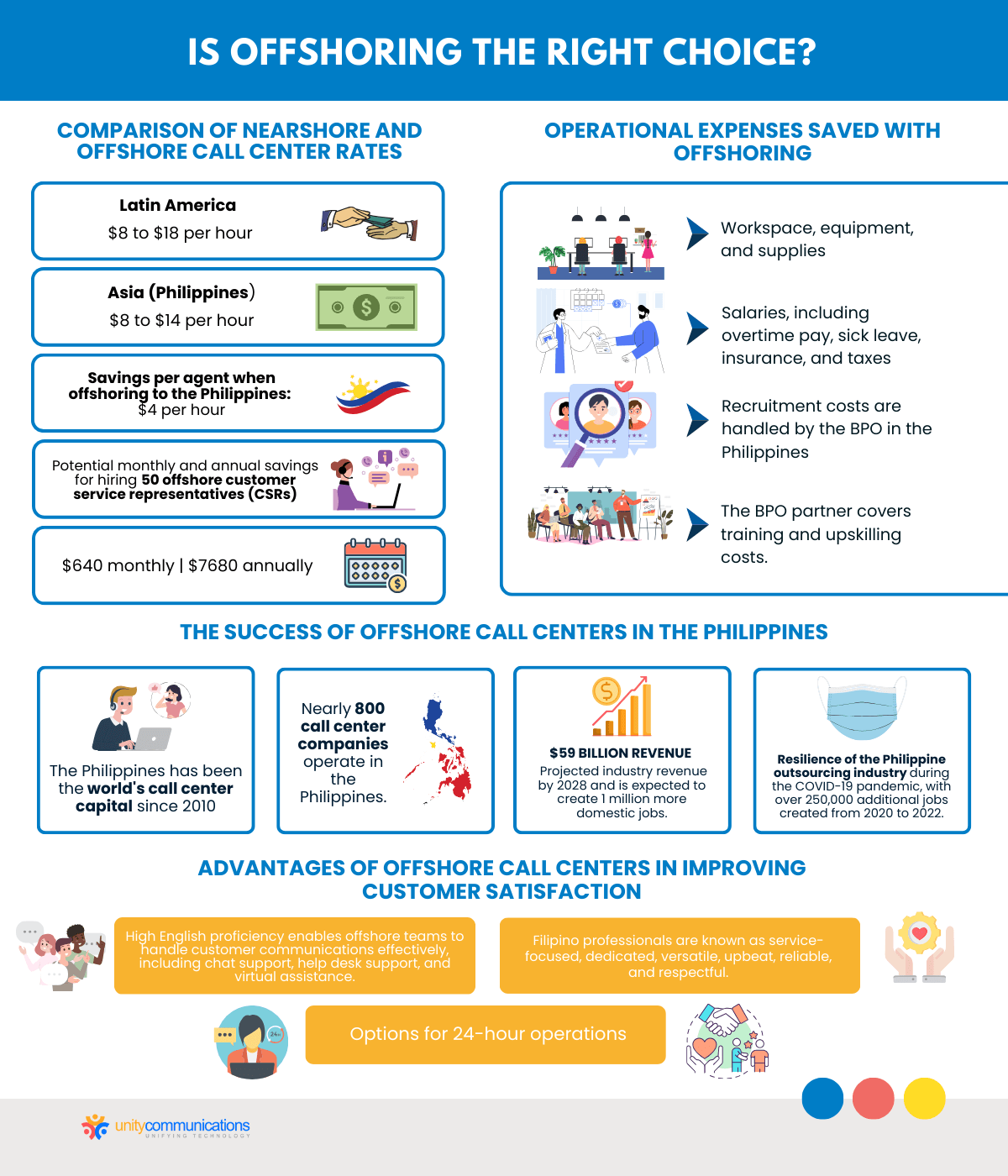Table of Contents
Many offshoring providers in the Philippines offer call center services to U.S. companies. They manage customer support, improving consumer fulfillment and experience to establish and sustain their loyalty.
Nearshoring companies in Mexico, Brazil, and other Latin American (LatAm) countries also provide the same call center operations and services as their Asian counterparts.
How do you determine which approach is right for your business?
Continue reading to learn more about nearshore and offshore call centers and the benefits of each outsourcing strategy.
Nearshore vs. Offshore Call Centers: Is Nearshoring the Best for Your Company?

Comparing nearshore and offshore call centers is similar to comparing apples grown in separate locations. They have several commonalities, but the differences lie in quality, price, and location, among other factors.
To thoroughly weigh nearshore against offshore call centers, let us first examine the benefits of nearshoring.
Consistency with U.S. Time for Better Response and Coordination
The primary advantage of nearshore call centers over offshore call centers is the minimal time zone difference, with U.S.-wide time zone gaps being one of the main issues with offshore outsourcing. For example, the Philippines, one of the world’s leading offshoring destinations, is 12 to 14 hours ahead of the U.S.
Adopting customer service outsourcing in the Philippines means that when your company in Arizona begins the work day at 9 a.m., the third-party call center agents must start their shifts at 9 p.m. for synchronous work.
In contrast, most states in the U.S. share the same date and time as Mexico and other LatAm nearshoring hubs. The various locations across borders run up to three hours ahead or behind.
So if your company in Arizona starts operations at 9 a.m. and ends at 6 p.m., the third-party Mexican team should begin at 10 a.m. and finish at 7 p.m. Arizona is only one hour behind Mexico. You and the nearshore team have almost identical work schedules.
Consider the perks of having a nearshore versus offshore call center team and working similar hours:
- Improved work-life balance. Healthy work boundaries benefit the nearshoring team. Third-party nearshore contractors experience fewer mental and physical stressors such as isolation, loneliness, or fatigue. Offshore call center agents who work late nights or graveyard shifts are vulnerable to these problems.
- Smoother communication and collaboration. Another nearshore advantage over offshore call centers is better teamwork and interaction. A smaller time gap leads to fewer delays in addressing customer issues, inquiries, or problems. Setting up online meetings is also faster and more convenient.
Cultural Resemblance for Deeper Customer Relationships
One advantage of hiring nearshoring instead of offshoring call center operations is that Mexico and other LatAm outsourcing spots have similar cultural settings as the U.S. Millions of Hispanics migrate and live in the U.S. At the same time, many Americans travel to LatAm regions (South America, Central America, and the Caribbean) for business and leisure.
Tens of millions of Latinos reside in the U.S., per the latest figures:
| Country | Total Immigrants in the U.S. |
|---|---|
| Mexico | 47 million (1) |
| Brazil | 1.7+ million (2) |
| Colombia | 1.2 million (3) |
| Nicaragua | 257,000 (4) |
| Argentina | 163,000 (5) |
| Chile | 90,000 (6) |
Sources: (1) Pew Research Center; (2) Expatriate Consultancy; (3) Latina Republic; (4) Migration Policy Institute; (5) Small World Money Transfer; (6) Statista
Below are some similarities connecting the two regions, making nearshoring superior to offshoring call centers in this aspect:
- Food. Many Americans appreciate Latino cuisine, including tacos, burritos, and enchiladas. Latinos enjoy burgers, hot dogs, and other U.S.-produced foods.
- History. LatAm countries and the U.S. were under European colonizers centuries ago. Each commemorates its independence from colonialism: Mexico on September 16, Brazil on September 7, Colombia on July 20, Nicaragua on September 15, Argentina on July 9, Chile on September 18, and the U.S. on July 4.
- Love for sports. America’s favorite pastimes are baseball and football, while Hispanics favor boxing and soccer.
- Geography. Like the U.S., many LatAm countries have vast landscapes, lengthy coasts, and culturally varied people. The environments differ from wilderness heat to alpine cold.
Bilingual Customer Support to Increase Sales and Revenue
What makes nearshore call centers better than offshore call centers is bilingual customer support. Nearshore customer service representatives (CSRs) in Latin America can switch between English and Spanish to deliver an excellent consumer experience to Americans.
Forbes states that 13% of the U.S. population speaks Spanish, making it the most popular non-English language in the country. The U.S. also has the world’s second-largest population of Spanish speakers after Mexico. Based on current trends, one in every three Americans will be fluent in Spanish by 2050.
Examine the benefits that enable nearshore to advance over offshore call center outsourcing:
- Increased diversity. Having bilingual customer service demonstrates that your organization values multiculturalism, giving clients an excellent impression of your company. It also indicates that you are culturally sensitive and run a contemporary, versatile business that caters to people from various backgrounds.
- Enhanced conversion rates. Closing a transaction is more challenging if consumers and CSRs do not understand each other. Customers are more interested in buying your products or services when they can speak with someone in their native tongue. Partnering with a multilingual service provider can help you increase conversions.
- Expanded market reach. Greater market expansion is why nearshore call centers dominate offshore call centers in this aspect. Entering foreign markets might be difficult because of language barriers. Hiring bilingual CSRs helps you generate sales faster as they can learn the preferences and needs of the new market.
- Improved product or service loyalty. The brand connection is stronger when customers clearly understand the CSRs. Many bilingual CSRs in LatAm countries assimilate U.S. expectations and preferences. They are ideal brand spokespeople.
Proximity to the U.S. for Higher Quality Control and Supervision
What makes nearshore call centers preferable to offshore call centers is the service provider’s proximity to the U.S. Location is a significant factor when deciding to delegate processes. Closer proximity gives you more control over the outsourced call center’s daily activities. It also makes communication simpler.
Beyond those two perks, the advantage of nearshore call centers over offshore call centers is that it is more convenient for the contact center managers and the third-party teams to meet you in person. If you are in Arizona, the team in Mexico City needs less than three hours to travel to your headquarters by plane, and the fare is more affordable.
In contrast, if your outsourcing team is in Manila, you must travel for over 15 hours. Adding to these are more expensive plane fares and hotel accommodations for the team. Nearshoring lets you and the third-party team travel across borders for upskilling, integration, and other purposes, leading to faster outcomes and improved interaction and cooperation.
Other benefits of proximity to the U.S.:
- Faster response. The third-party team can quickly resolve customer concerns, resulting in happier consumers and improved service for higher retention rates.
- Increased visibility. Visibility is another factor that distinguishes nearshoring from offshoring operations. You get a better understanding of the market. Greater awareness of the local business environment contributes to more effective marketing and staff recruitment activities.
Low Attrition Rate for Sustained First-Rate Customer Service
A perk of adopting nearshore rather than offshore call center operations is that LatAm outsourcing destinations have low attrition rates. Many call centers worldwide struggle with staff turnover. The Philippines’ average turnover rate ranges between 30% and 40% (one of the highest in the industry), while LatAm has the lowest at less than 15%.
Why the low attrition rate in the region? Based on the latest findings, the most significant element keeping talent across Mexican contact centers was the work setting, with 30% of respondent organizations seeing it as critical to worker fulfillment. Career development came in second, with 21% seeing it as a factor in retaining staff members.
While the latest findings in Mexican contact centers can also apply to other LatAm countries, the Philippines’ case is different. The typical causes of high attrition in Philippine call centers include a preference for remote work, heavy workloads, insufficient upskilling, a lack of acknowledgment, and dire work conditions (difficulty commuting and clocking out late).
Check out some advantages of low attrition rates when choosing nearshore over offshore call center operations:
- Greater customer service. Low attrition rates indicate that the agents remain with the service provider for an extended time, expanding their knowledge of your brand. They better understand your operations, products and services, customer concerns, and challenges.
- Stronger customer relationships. Call center agents who are committed to their jobs and are satisfied with their duties display high morale. CSRs are motivated to offer more positive customer service experiences. They can establish deeper relationships for greater consumer loyalty.
Nearshore vs. Offshore Call Centers: Is Offshoring the Right Choice?

Let us now compare nearshore with offshore call centers by looking into the benefits of offshoring.
More Competitive Service Charges to Reduce Operating Expenses
Unlike nearshoring, offshoring call centers in the Philippines and similar hubs offer affordable fees for their services. One reason is that they have lower labor costs than nearshore destinations.
Here are the average rates of nearshore versus offshore call centers:
| Region | Outsourced Call Center Services Rates (per Hour) |
|---|---|
| Latin America | $8 to $18 |
| Asia (Philippines) | $8 to $14 |
Taking the highest cost per head of these regions, you save $4 ($18 to $14) hourly per agent when assigning call center functions to a business process outsourcing (BPO) company in the Philippines. If you hire 50 offshore CSRs, you save $200 hourly ($4 x 50), $8,000 monthly ($200 x 40 hours), or $96,000 ($8,000 x 12 months) annually.
Note that this is a basic illustration of call center operating costs. Contacting a service provider in the Philippines is recommended for the exact service fees.
Discover the other operating expenses you save when choosing nearshore over offshore call centers:
- Workspace, equipment, and supplies. You are not required to get additional computer systems, digital devices, or office space.
- Salaries. Your regular staff receives consistent pay, regardless of business conditions. Overtime pay, sick leave, insurance, and taxes are all included in their salaries.
- Recruitment. Acquiring full-time staff is typically expensive. The BPO in the Philippines can handle all recruitment processes on your behalf. It provides you with an offshore team available for duty.
- Training and upskilling. Your BPO partner re-trains and upgrades the offshore team’s skills to address new challenges. It also pays for training programs and initiatives.
English Proficiency for Flawless Communication and Understanding
Unlike nearshore call centers, offshore call center teams in the Philippines are skilled in written and verbal English communication. The nation has regularly landed in the top 30 of 111 countries in the annual EF English Proficiency Index (EF EPI). In 2022, it placed 22nd overall. Its proficiency level is comparable to that of many Western European countries.
Filipino remote workers with strong English skills can easily engage with you and your customers. The language barrier is the least of your concerns. With high English proficiency, outsourcing to the Philippines is a worthy investment. Aside from call center services, you can delegate chat support, help desk support, and virtual assistance.
When communicating or conversing with consumers, offshore customer service teams fluent in English can quickly convey their meaning. They can handle consumer problems and questions more credibly, resulting in better customer approval and journeys.
When comparing nearshore and offshore call centers, the latter can deliver higher customer satisfaction and experience, leading to the following:
- More favorable feedback. Providing outstanding customer experiences builds brand loyalty. Customers are unlikely to switch to your competitor if you regularly offer excellent service. On the contrary, they will return to buy more and try new items or services.
- Reduced acquisition expenses. Spending more money on advertising or marketing is no longer necessary to attract new or prospective customers. Buyers who are pleased with your services or products will tell others about them.
- Enhanced brand credibility. Your company’s identity distinguishes it from the competition. A solid brand reputation gives you a competitive advantage and a higher possibility of market dominance.
Distinctive Work Traits to Improve Morale and Productivity
Unlike nearshore agents, offshore call center agents in the Philippines have work qualities that help them deliver consistently excellent customer service and increase support effectiveness.
Examine some distinguishing work attributes of Filipino professionals and why nearshore plays second fiddle to offshore call centers:
- Service-focused. Filipino professionals naturally welcome foreigners. Hospitality and service are part of their culture. They strive to deliver the best service to tourists, consumers, and clients.
- Dedicated and versatile. Most Filipino contractors are conscientious, approaching their tasks with passion and responsibility. They constantly come up with reasonable solutions to workplace issues.
- Upbeat. Filipino workers tend to see the positive side of an unacceptable or difficult scenario. Regardless of the circumstances, remote staff with a cheerful and optimistic mindset retain productivity, performance, and customer relationships.
- Reliable. Filipinos are often trustworthy workers. These professionals can complete duties within your standards and with little oversight when comfortable with the job. They are also enthusiastic team players, quick learners, and engaged listeners.
- Respectful. Filipino team members treat their supervisors and seniors with dignity. During talks, they call them “sir,” “boss,” “ma’am,” or “TL (team leader).” Considerable respect demonstrates the conformity, dedication, and discipline essential for success.
The specific work characteristics of Filipino professionals contribute to raising collective morale, leading to:
- Improved revenue derived from higher productivity and performance
- Better health conditions due to diminished work anxieties
- Higher staff retention as a result of greater job satisfaction
- Larger savings because of fewer absences
- Decreased absenteeism and tardiness on account of solid work motivation
- Increased creativity and ingenuity since they are driven to strive and succeed
Shifting Work Schedules for Continuous Customer Service
Compared to nearshore call centers, offshore call center teams in the Philippines are adaptable. Third-party agents are ready to work anytime, regardless of time zone, holidays, late hours, or weekends. Swapping shifts and having weekend arrangements are normal work practices in offshore outsourcing.
Outsourcing to the Philippines and other offshore hubs is ideal for 24-hour customer support. If your company is in the U.S., your on-site or onshore crew can manage the daytime work while the offshore team takes over at night.
Your internal staff and third-party agents can address customer problems and tickets more efficiently with 24/7 operations. Since agents are readily available to answer messages and calls, customers will experience minimal waiting times and delays.
Check out the other advantages of 24-hour service and why nearshore is second to offshore call centers:
- Provide many communication modes. You can enhance customer communications by offering technical or sales assistance 24/7. You can also develop a multifaceted communication platform integrating live chats, chatbots, and messaging apps.
- Attract clients from different time zones. With no closing time, you are open anytime to consumers worldwide. Entering the international market is possible if you provide continuous service. A bigger market reach translates to a higher consumer base, improving sales and revenue.
- Achieve a competitive advantage. Continuous assistance is an efficient strategy to enhance your reputation and obtain a competitive advantage over industry rivals. This is a proven practice because large e-commerce enterprises provide 24/7 customer service to differentiate themselves.
Undivided Focus on Training to Sharpen CSRs’ Customer Service Skills
When compared against nearshoring, offshoring call centers in the Philippines highly emphasize the execution of proven training techniques to help agents bring out their full potential in customer support. Regularly implementing an effective training program is necessary to get the most from agents and help them with customer challenges.
Below are some training procedures explaining why nearshore call centers are behind offshore call centers in delivering excellent customer satisfaction and a consistent experience:
- Shadowing colleagues. This training strategy pairs a recruit with an experienced agent. The novice learns by examining the colleague executing the task. Shortcuts, alternatives, and innovative solutions are skills that a beginner can acquire.
- Playing out situations. Role-playing can help an agent handle the most difficult challenges by putting them in actual-life scenarios. They practice their abilities by playing out situations with the most demanding consumers.
- Handling a crisis. Offshore call center agents are trained to manage a crisis. This method divides the customer service team into two or more groups. They then try to resolve an emergency quickly, helping enhance their abilities to manage and work under pressure.
- Refraining from unfavorable responses. Exercises in rephrasing and summarizing are valuable to better understand customer demands, problems, or concerns. This method trains agents to convert negative responses, such as “no,” into positive ones.
- Practicing with games. Customer service games are icebreakers that promote communication and collaboration among team members. Training games are among the most popular and enjoyable activities. They help agents react accordingly, think on their feet, and hone their inventiveness.
Fierce Call Center Market to Offer the World’s Best Customer Service
Compared to nearshoring, offshoring call centers fare better. For instance, the Philippines has earned the world’s call center capital title since 2010. This means businesses worldwide prefer outsourcing their call center operations to this country over other hubs. It also indicates that Filipino CSRs are the best at managing inbound and outbound calls.
According to the Philippine Economic Zone Authority (PEZA), the country has nearly 800 call center companies. Financial institutions, telecommunications providers, e-commerce stores, and telemarketing companies are some business segments that depend on Filipino call centers for support, service, and sales.
The Philippine BPO sector comprises various services, such as voice and non-voice capabilities. The call center service accounts for a substantial part of this industry. By 2028, the industry could reach $59 billion in revenue. The IT and Business Process Association of the Philippines (IBPAP) projects the sector can generate at least 1 million more domestic jobs.
IBPAP President and CEO Jack Madrid notes that despite the COVID-19 pandemic that caused a major economic downturn, the Philippine outsourcing industry churned out additional employment. Over 250,000 jobs were available to the local workforce from 2020 to 2022. The industry outperformed other business segments that suffered during the global health crisis.
Offshore call centers in the Philippines also receive additional help from the national government. During lockdowns, the government allowed BPO providers to use remote work setups while maintaining tax incentives. Outsourcing companies took advantage of this measure, enabling the industry to run normally amid the pandemic.
The Bottom Line

To build and implement a solid call center plan, you must understand the pros and cons of outsourcing to the Philippines, Mexico, and other outsourcing locations.
So which outsourcing strategy is right for you? Where should you delegate your business processes?
Nearshore and offshore call centers have their own strengths and weaknesses. They both have different benefits. Your business objectives and needs determine whether to outsource to either location. Acquiring the right outsourcing plan improves performance, productivity, and revenue.
Let’s connect if you need to know more about the nearshore and offshore call centers in the Philippines.




